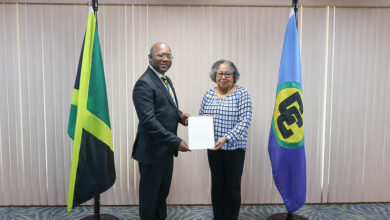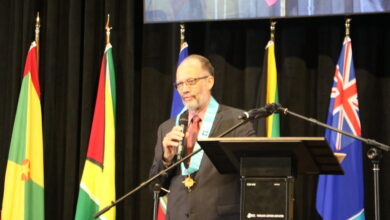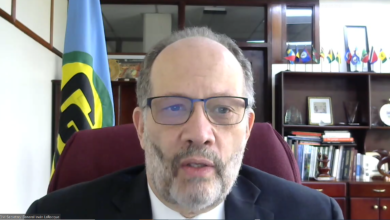Excellency, it is my pleasure to receive today your letter accrediting you as Belgium’s first Plenipotentiary Representative to the Caribbean Community. It marks an important step forward in relations between CARICOM and Belgium.
It is, I believe, symbolically important and certainly fitting that Belgium should take this significant step in formalizing bilateral relations with the Caribbean Community given the long history shared by the States of CARICOM and those of the European Union (EU) of which Belgium is an important member. Belgium, as most of you will know, is commonly referred to as the capital of the EU, hosting as it does some of its most critical institutions, namely the European Council, the Council of Ministers, the European Commission and the European Parliament.
Your Excellency, Belgium is uniquely placed to comprehend the challenges as well as the immense opportunities inherent in building integration. Many of the challenges that the developed Member States of the EU have confronted as a collective, in the course of forging and refining the EU, particularly in recent times, the developing Member States of the Caribbean Community have had to confront as well, but with greater intensity.
Countries, even the most powerful amongst them, have come to understand that growth and stability are not achieved through disciplined self-regulation alone, but also requires collective action and partnership. In today’s interconnected and globalized world, no state can stand alone.
That reality has long been known to the Member States of CARICOM, all of whom are small, open and vulnerable to the fluctuations of external markets, the vagaries of the global economy, and increasingly disruptive natural events provoked by the still unchecked effects of climate change.
That vulnerability has become even more acute as, in grappling with the effects of the global financial and economic crises which have brought on severe fiscal challenges for most of our Member States, they also have to contend with the policy of differentiation or graduation. This policy, which is now being applied by the EU, denies the Community’s Small, Highly-Indebted Middle Income Countries reduced access to concessionary funding to pursue their social and economic development goals at this most trying of times. Even as we appreciate the assistance that we have been receiving from the EU, we would urge that there is a revisiting of the policy of differentiation.
Ambassador, I am certain you will agree that true partnerships, like the one being consolidated today, will help in meaningfully addressing each other’s challenges.
Allow me to highlight just a few of the areas in which our countries can build such a partnership.
Human Resource Development is an area on which CARICOM places great emphasis. We believe that the people of the Caribbean are the greatest asset of our Region. The full exploitation of their potential, particularly the potential of our youth, is a priority for CARICOM and we welcome any opportunities to partner in this regard.
Another possible area for cooperation is health. For CARICOM, the phrase “the health of the region is the wealth of the region” is not just a catchy saying. It is a deeply held truth. CARICOM is therefore always ready and eager to partner in securing the health, not only of its own citizens but the global citizenry. CARICOM States have placed themselves at the forefront of the challenge to focus global attention on the negative impact of Non-Communicable Diseases (NCDs) on development. We look forward to working with Belgium in advancing the plans outlined in the Declaration of the United Nations High Level Meeting in 2011 to reduce the impact of NCDs on the health of our citizens and on our economies.
Ambassador, of great importance to CARICOM is the stemming of the flow of illegal arms given the threat that small arms pose to citizen security in our countries. The global community recently made an important stride in putting in place measures to deal with this issue with the conclusion of the United Nations Arms Trade Treaty. CARICOM would welcome the opportunity for Belgium to join us in maintaining the momentum created with the adoption of the Treaty, in order to see concrete action to arrest this illegal trade, and closely related with it, the trade in illegal narcotics.
One of the most pressing issues of our time and one on which it is incumbent upon every responsible Member State of the global community to act – is that of climate change. While the debate on how to treat with this issue continues, the stark reality is that climate change and its related phenomena of sea level rise, increased frequency and intensity of natural disasters, and drastic changes in weather patterns, are threatening the very survival of our Member States. We require strong global partnerships of countries determined to advance climate negotiations and in this matter CARICOM looks forward to Belgium’s support.
Finally Ambassador, the global community is on the threshold of yet another seminal development accord, the Post 2015 Development Agenda. That Agenda holds much promise for addressing the development challenges in a more holistic way, and certainly CARICOM States harbour the expectation that the special interests of small middle income states will be taken into account. In particular, it is an opportunity to redefine development and move away from the narrow statistical application of per capita income as its basis. Again we count on the sensitivities of our partners to understand our realities and take on board our positions.
Your Excellency, your varied experience – from Manila to Mexico and from Hong Kong to Brazil – will have undoubtedly more than adequately equipped you, to assume the distinguished responsibility placed upon you, by your Government to be Belgium’s first Ambassador to CARICOM. Please be assured that you can count on my support and that of my staff here at the Secretariat.
Ambassador Van den Bergh, I formally bid you, as Belgium’s Plenipotentiary Representative, a very warm welcome to the Caribbean Community!





